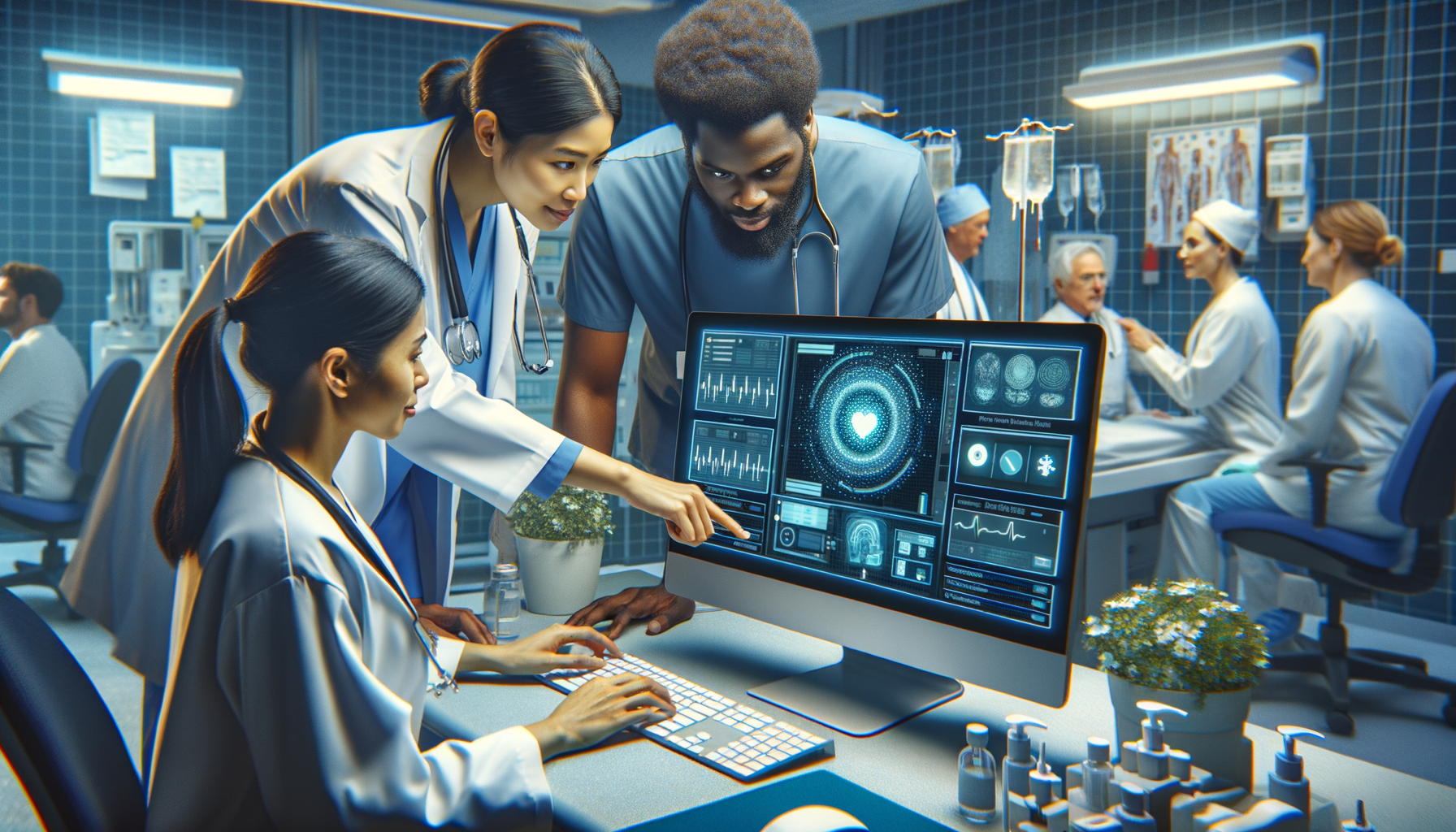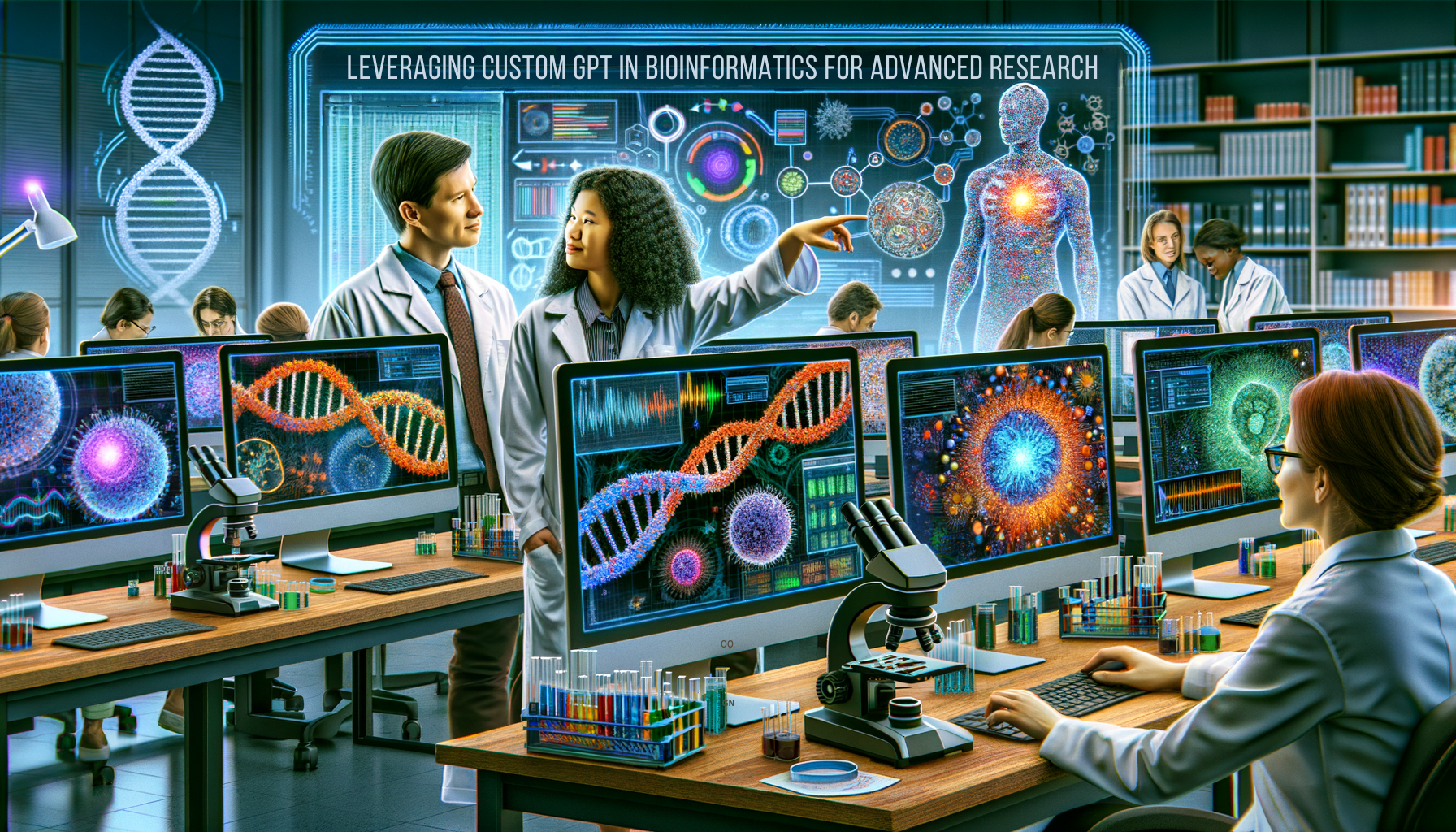
Imagine a world where solving digital crimes is as swift and precise as a detective in a blockbuster movie. In reality, digital forensics often involves painstakingly sifting through mountains of data, a process that can take weeks or even months.
But what if there was a way to revolutionize this field, making it faster and more accurate? Enter Custom GPT technology. This cutting-edge AI tool is transforming how digital forensics experts analyze evidence, recover data, and solve cases.
With its no-code visual builder and anti-hallucination features, CustomGPT.ai is leading the charge, offering unparalleled efficiency and accuracy. Let’s dive into how this technology is changing the game.

The Evolution of Digital Forensics
Digital forensics has come a long way since its inception. In the early days, it was all about manually sifting through data, a tedious and time-consuming process. Imagine trying to find a needle in a haystack, but the haystack is made of ones and zeros.
Fast forward to today, and we have sophisticated tools that can automate much of this work. Yet, even with these advancements, challenges remain. The sheer volume of data and the complexity of modern digital environments can overwhelm traditional forensic methods.
Enter Custom GPT technology. This game-changer leverages AI to not only speed up the process but also enhance accuracy.
By understanding and predicting text, it can sift through data with unprecedented efficiency. It’s like having a supercharged detective on your team, ready to crack the case in record time.
The Role of AI in Modern Forensics
AI is transforming the landscape of digital forensics. Gone are the days when investigators had to manually comb through endless data. Today, AI tools can analyze vast amounts of information in seconds, identifying patterns and anomalies that would take humans weeks to uncover.
Imagine trying to find a single piece of evidence in a sea of digital noise. AI makes this task not only possible but efficient. It can sift through emails, social media, and even encrypted files, pinpointing crucial data with laser-like precision.
But it’s not just about speed. AI enhances accuracy, reducing human error and increasing the reliability of findings. CustomGPT.ai, with its no-code visual builder and anti-hallucination features, stands out as a game-changer.
It ensures that the data analyzed is relevant and accurate, making it an indispensable tool for modern forensic investigations.
Understanding Custom GPT Technology
Imagine having a personal assistant who not only understands your every need but also anticipates your next move. Sounds like a dream, right? This is the magic of Custom GPT technology. It’s not just another AI tool; it’s a revolution in how we interact with data.
Think about the last time you had to dig through endless files to find a single piece of information. Frustrating, isn’t it? Custom GPT changes all that. With its no-code visual builder, you can create powerful AI chatbots without writing a single line of code.
But that’s not all. CustomGPT.ai also boasts anti-hallucination features and industry-leading query relevancy. This means you get accurate, reliable information every time. It’s like having a supercharged detective on your team, ready to crack the case in record time.
Let’s dive deeper into how this technology works and why it’s a game-changer for digital forensics.
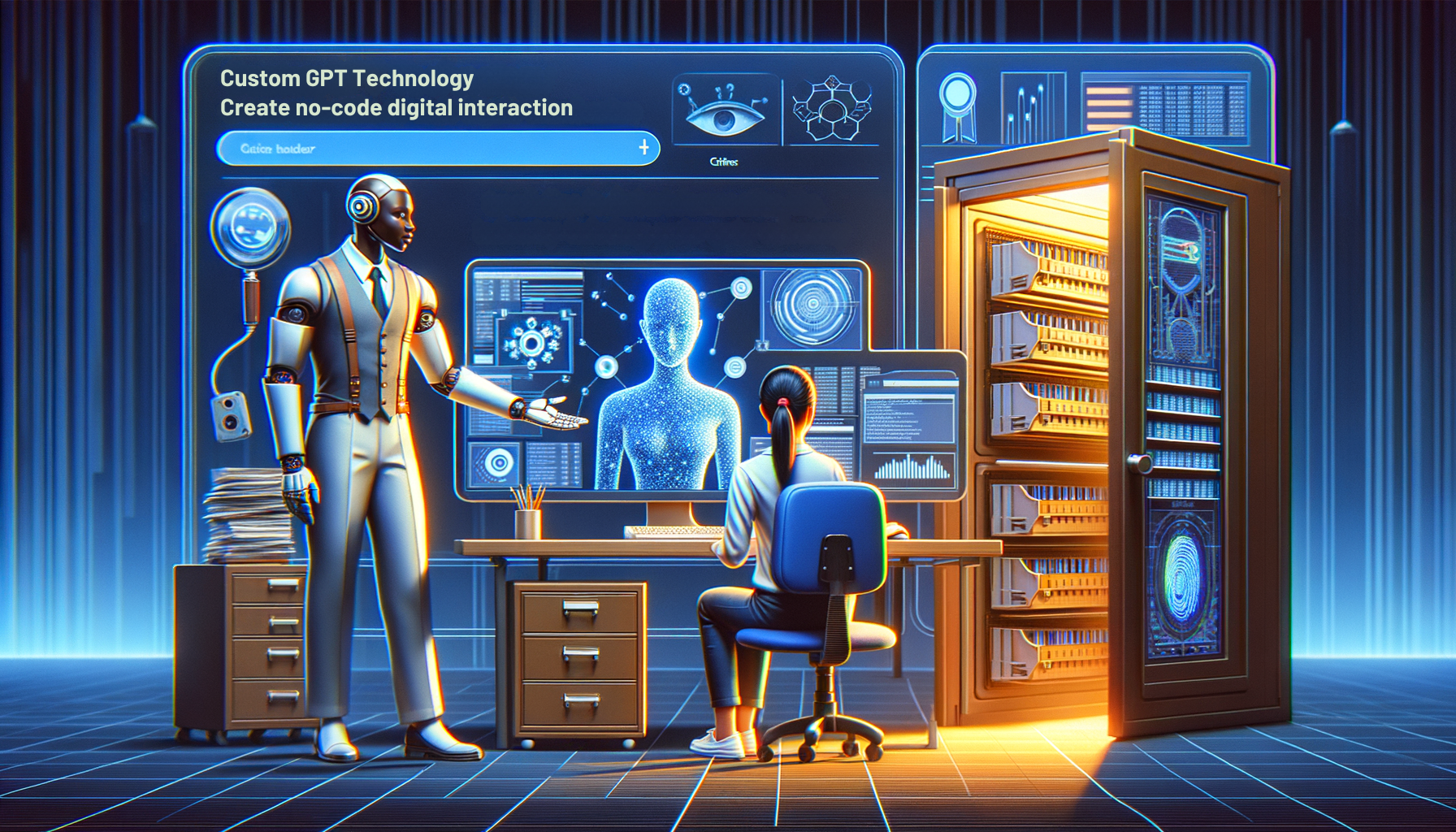
What is GPT Technology?
Ever stumbled upon a piece of technology that makes you go, “Wow, how does this even work?” That’s GPT for you. GPT, or Generative Pre-trained Transformer, is like the brainiac friend we all wish we had in school.
It’s an AI model trained on a vast ocean of text data, enabling it to understand, generate, and even predict text in ways that feel almost human-like.
Imagine having an assistant that not only knows your content inside out but also how to present it in the most engaging way possible. That’s the power of GPT. It can write articles, answer questions, and even hold conversations, all while sounding incredibly natural.
But what makes GPT truly revolutionary is its adaptability. Whether you’re managing a website, handling customer service, or diving into digital forensics, GPT can be tailored to meet your specific needs.
It’s not just a tool; it’s a game-changer in how we interact with technology.
Customizing GPT for Forensic Applications
Imagine having a digital detective that never sleeps. Customizing GPT for forensic applications turns this dream into reality. With CustomGPT.ai, you can tailor AI to meet the specific needs of forensic investigations.
Think about the complexity of sifting through terabytes of data. CustomGPT.ai simplifies this by using its no-code visual builder, allowing you to create specialized chatbots without needing a developer.

These chatbots can analyze data, identify patterns, and even flag suspicious activities with pinpoint accuracy.
But it doesn’t stop there. The anti-hallucination feature ensures that the information you get is reliable and relevant. This is crucial in forensic work where accuracy can make or break a case.
Plus, with built-in monetization and easy deployment widgets, integrating these custom GPTs into your workflow is seamless. CustomGPT.ai is not just a tool; it’s a revolution in digital forensics.
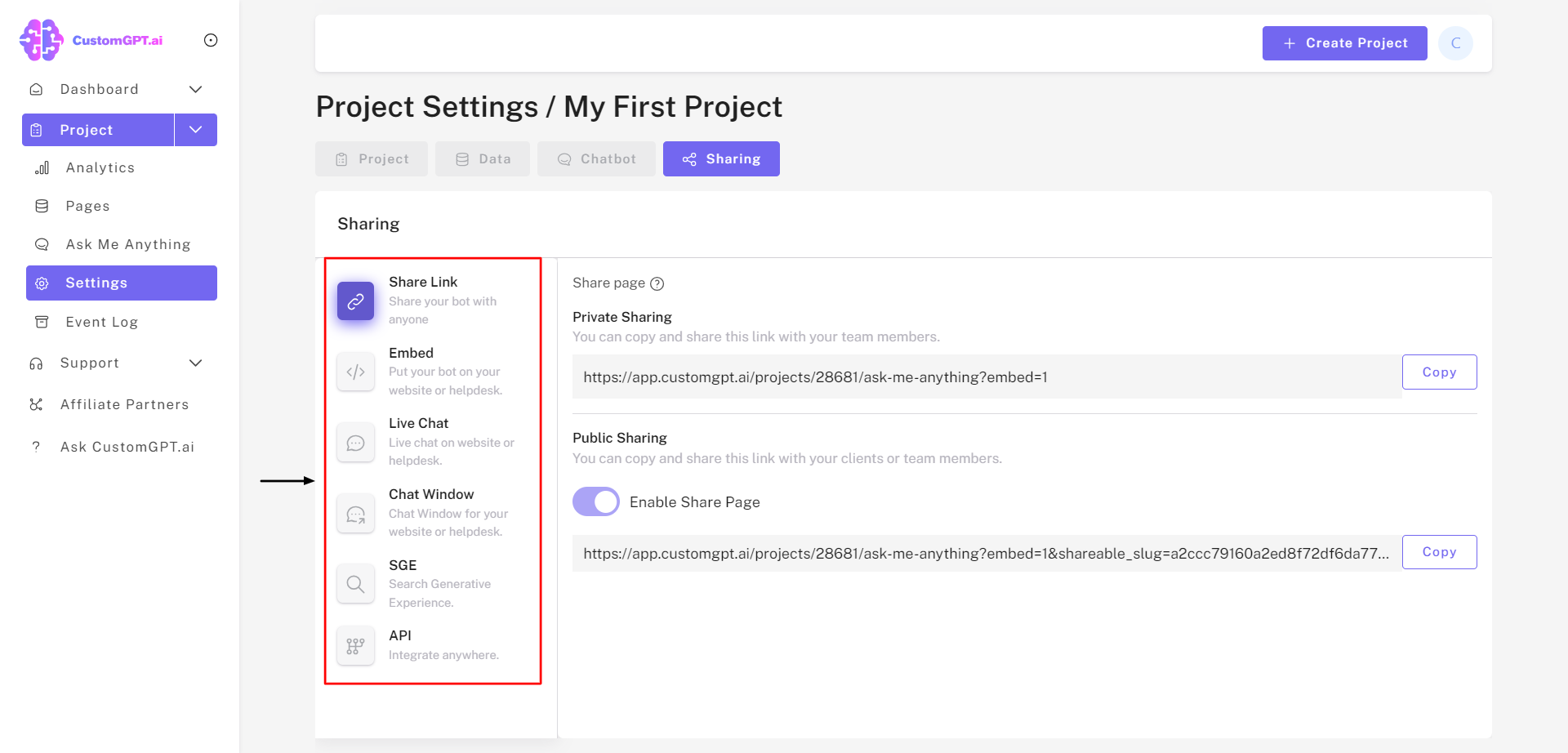
Applications of Custom GPT in Digital Forensics
Imagine you’re a detective in a high-stakes investigation, but instead of a magnifying glass, you have a supercomputer at your disposal. This is the reality with Custom GPT technology in digital forensics.
Did you know that the average person generates about 1.7 megabytes of data every second? Now, multiply that by millions of users, and you get an idea of the data deluge forensic experts face. Traditional methods can’t keep up, but Custom GPT can.
CustomGPT.ai transforms this challenge into an opportunity. It automates evidence analysis, enhances data recovery, and even predicts criminal patterns. With its no-code visual builder, creating specialized forensic tools is a breeze.
Imagine solving cases faster, with pinpoint accuracy, and minimal effort. That’s the power of Custom GPT in digital forensics. Let’s explore how this technology is revolutionizing the field, one byte at a time.
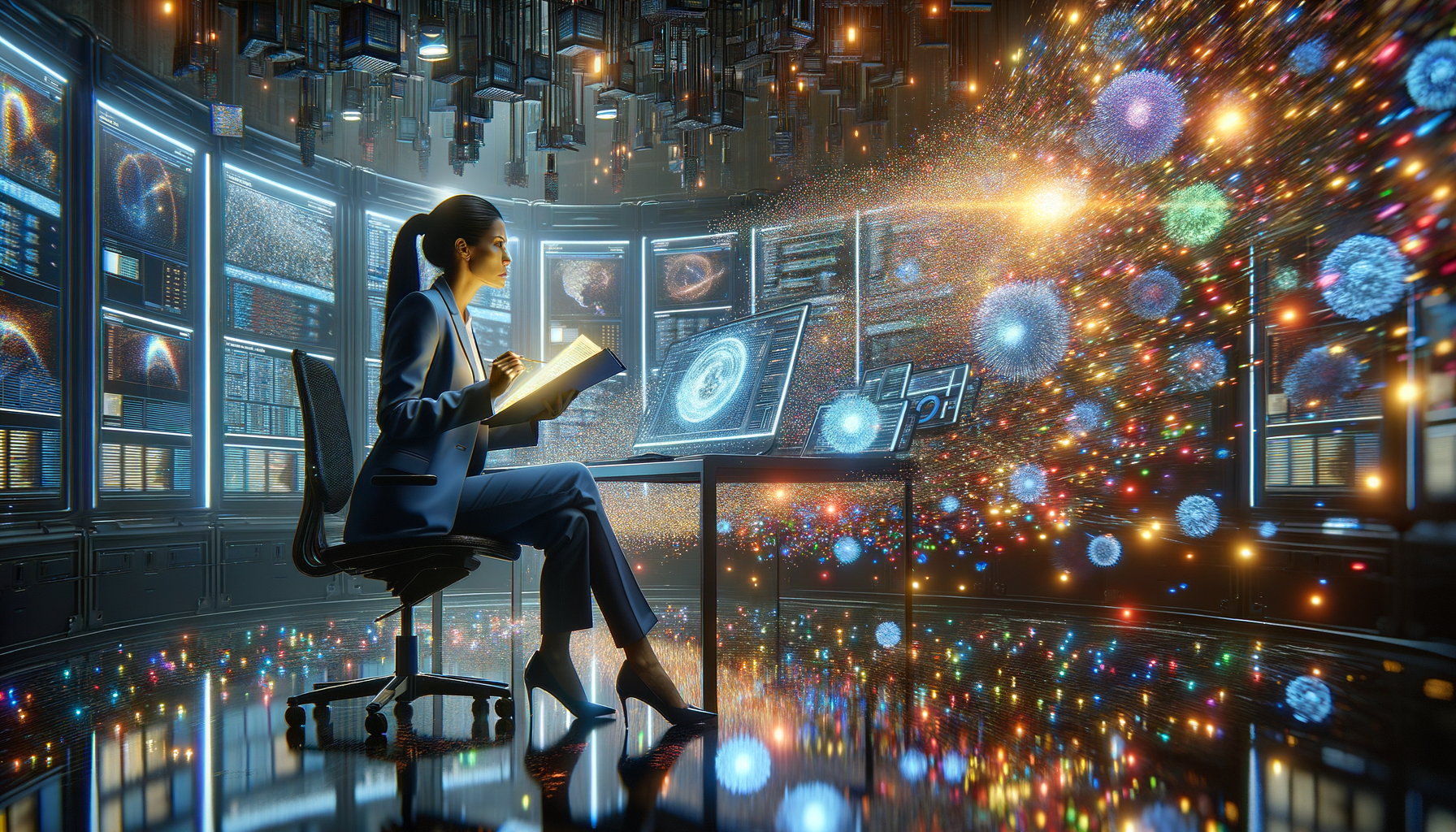
Automating Evidence Analysis
Picture this: you’re knee-deep in a digital investigation, sifting through mountains of data. It’s tedious, right? Enter Custom GPT technology, your new best friend in automating evidence analysis.
CustomGPT.ai takes the grunt work out of the equation. With its no-code visual builder, you can create specialized chatbots that comb through data at lightning speed. These bots can identify relevant information, flag anomalies, and even predict patterns of malicious activity.
But here’s the kicker: CustomGPT.ai’s anti-hallucination feature ensures the data you get is accurate and reliable. No more second-guessing or manual cross-checking. This means you can focus on what really matters—solving the case.
Imagine cutting down hours of manual labor to mere minutes. That’s the power of automating evidence analysis with Custom GPT. It’s not just a time-saver; it’s a game-changer in digital forensics.
Enhancing Data Recovery Processes
Imagine losing critical data in the middle of an investigation. It’s a nightmare scenario. But with Custom GPT technology, data recovery becomes a breeze.
CustomGPT.ai excels in automating and enhancing data recovery processes. Its no-code visual builder allows you to create specialized chatbots that can sift through corrupted or lost data with ease. These bots can identify, retrieve, and restore essential information quickly, minimizing downtime.
The anti-hallucination feature ensures that the recovered data is accurate and reliable. This is crucial in forensic work where every byte of data counts. Plus, the built-in monetization and easy deployment widgets make integrating these custom GPTs into your existing systems seamless.
Imagine turning hours of painstaking data recovery into minutes. That’s the power of CustomGPT.ai. It’s not just a tool; it’s a lifeline in digital forensics, ensuring you never lose critical information again.
Challenges and Considerations
Imagine you’re a digital forensics expert, hot on the trail of a cybercriminal. You’ve got all the tools, but suddenly, you hit a wall—legal red tape, ethical dilemmas, and technical glitches. Frustrating, right?
Did you know that over 90% of digital forensic cases face some form of technical or legal challenge? It’s a staggering statistic that highlights the complexities of this field. While Custom GPT technology offers groundbreaking solutions, it’s not without its hurdles.
From ensuring data privacy to navigating the intricacies of AI regulations, the path is fraught with obstacles. And let’s not forget the technical limitations—AI isn’t perfect. It can misinterpret data or even miss crucial evidence.
But don’t worry, we’ve got you covered. In this section, we’ll dive into the challenges and considerations you need to be aware of. Understanding these will help you leverage Custom GPT technology effectively, ensuring your investigations are both efficient and compliant.

Ethical and Legal Implications
Let’s face it: diving into digital forensics with AI isn’t just about tech. It’s a minefield of ethical and legal implications.
First off, data privacy is a huge concern. Custom GPT technology can sift through vast amounts of data, but how do we ensure it respects privacy laws? Missteps here can lead to serious legal repercussions.
Then there’s the issue of bias. AI models can inadvertently perpetuate biases present in their training data. This can skew investigations and lead to unfair outcomes. It’s crucial to implement checks and balances to mitigate this risk.
Finally, there’s the question of accountability. If an AI makes a mistake, who is responsible? Navigating these ethical and legal waters requires a careful, informed approach. CustomGPT.ai’s anti-hallucination feature and citation capabilities can help, but human oversight remains essential.
In short, while Custom GPT technology offers incredible potential, it’s vital to tread carefully and responsibly.
Technical Limitations and Solutions
Let’s talk tech. Even the best tools have their quirks, and Custom GPT technology is no exception.
One major limitation is data accuracy. AI can sometimes misinterpret or overlook crucial details. This is where CustomGPT.ai’s anti-hallucination feature shines. It ensures the data retrieved is accurate and reliable, reducing the risk of errors.
Another challenge is integration. Many forensic tools are complex and don’t play well with others. CustomGPT.ai tackles this with its no-code visual builder and easy deployment widgets. You can integrate it seamlessly into your existing systems without needing a team of developers.
Lastly, there’s the issue of scalability. Handling large volumes of data can be daunting. CustomGPT.ai’s industry-leading query relevancy ensures that even as data scales, the performance remains top-notch.
In short, while technical limitations exist, CustomGPT.ai offers robust solutions to keep your digital forensics on track.
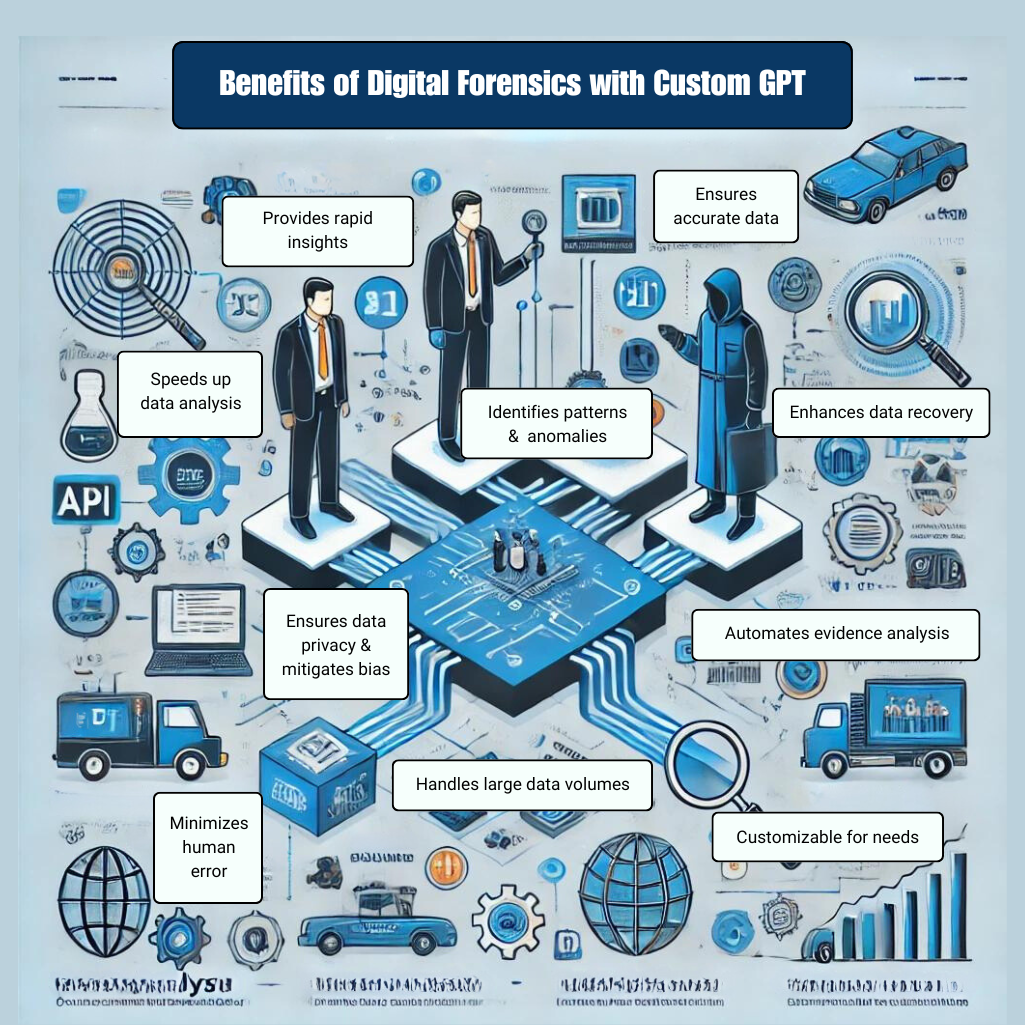
FAQ
1. What is Custom GPT technology and how does it apply to digital forensics?
Custom GPT technology is a groundbreaking AI tool that leverages Generative Pre-trained Transformers (GPT) to understand, generate, and predict text in a way that feels incredibly human-like. Unlike standard AI models, Custom GPTs are tailored to meet specific needs, making them highly adaptable and efficient.
In the realm of digital forensics, Custom GPT technology is a game-changer. Traditional forensic methods often involve manually sifting through vast amounts of data, a process that can be both time-consuming and error-prone. CustomGPT.ai, with its no-code visual builder, allows forensic experts to create specialized chatbots that can automate this tedious work.
These chatbots can analyze data, identify patterns, and flag suspicious activities with pinpoint accuracy. The anti-hallucination feature ensures that the information retrieved is reliable and relevant, which is crucial in forensic investigations. By integrating Custom GPT technology, digital forensics becomes faster, more accurate, and significantly more efficient.
2. How does CustomGPT.ai ensure data accuracy and reliability in forensic investigations?
Ensuring data accuracy and reliability is crucial in forensic investigations, and CustomGPT.ai excels in this area. Here’s how:
- Anti-Hallucination Feature: One of the standout features of CustomGPT.ai is its anti-hallucination capability. This ensures that the AI does not generate false or misleading information, which is critical in forensic work where accuracy is paramount.
- Retrieval-Augmented Generation (RAG) Technology: CustomGPT.ai integrates RAG technology, which combines retrieval-based and generative methods. This approach enhances the precision and relevance of responses by grounding them in user-provided data, ensuring that the information is both accurate and contextually appropriate.
- Citations and Source Verification: CustomGPT.ai provides citations for the information it retrieves, allowing forensic experts to verify the sources of the data. This transparency is essential for maintaining the integrity of forensic investigations.
- Continuous performance monitoring: CustomGPT.ai offers robust analytics capabilities that enable users to track the performance of their tailored questions and responses. This continuous monitoring helps in identifying and rectifying any inaccuracies, ensuring the system remains reliable over time.
By leveraging these features, CustomGPT.ai ensures that forensic investigations are not only efficient but also highly accurate and reliable.
3. What are the ethical and legal considerations when using AI in digital forensics?
Using AI in digital forensics brings a host of ethical and legal considerations that must be carefully navigated. Here are some key points to consider:
- Data Privacy: AI systems can process vast amounts of data, raising significant privacy concerns. Ensuring compliance with data protection laws, such as GDPR, is crucial. CustomGPT.ai’s anti-hallucination feature helps mitigate risks by ensuring the data analyzed is accurate and relevant, but human oversight remains essential.
- Bias and Fairness: AI models can inadvertently perpetuate biases present in their training data. This can lead to unfair outcomes in forensic investigations. Implementing checks and balances to identify and mitigate bias is critical. CustomGPT.ai’s citation capabilities allow for transparency and verification, helping to address these concerns.
- Accountability and Transparency: Determining who is responsible when an AI system makes a mistake is a complex issue. Clear guidelines and accountability measures must be established. CustomGPT.ai provides citations for the information it retrieves, enhancing transparency and allowing forensic experts to verify sources.
- Legal Admissibility: For AI-generated evidence to be admissible in court, it must meet rigorous standards. This includes ensuring the AI tools used are reliable and their methodologies are transparent. CustomGPT.ai’s robust analytics and anti-hallucination features support the reliability and accuracy of the data, aiding in meeting these legal standards.
Navigating these ethical and legal waters requires a careful, informed approach. While Custom GPT technology offers incredible potential, it is vital to tread carefully and responsibly to ensure ethical and legal compliance in digital forensics.
4. How can CustomGPT.ai be integrated into existing forensic tools and workflows?
Integrating CustomGPT.ai into existing forensic tools and workflows is a seamless process that enhances efficiency and accuracy. Here’s how you can do it:
- API Integration: CustomGPT.ai provides robust APIs that can be integrated into your current forensic tools. This allows you to leverage AI capabilities such as text generation, data analysis, and content summarization directly within your existing systems. The API is included in all plans, making it accessible for various applications.
- No-Code Visual Builder: With CustomGPT.ai’s no-code visual builder, you can create custom chatbots tailored to your forensic needs without writing a single line of code. This feature simplifies the integration process, allowing forensic experts to develop specialized tools quickly and efficiently.
- Seamless Deployment: CustomGPT.ai offers easy deployment widgets that can be embedded into your workflows. These widgets facilitate the integration of AI capabilities into your forensic processes, ensuring that the transition is smooth and that the tools are immediately impactful.
- Enhanced Automation: By integrating CustomGPT.ai with scripting languages like PowerShell, you can automate repetitive tasks such as data retrieval and analysis. This not only streamlines workflows but also improves productivity by allowing forensic experts to focus on more complex aspects of investigations.
- Scalability and Flexibility: CustomGPT.ai’s scalable infrastructure can handle large volumes of data and requests, making it suitable for enterprise-level forensic applications. Its flexibility ensures that it can be tailored to meet the specific needs of different forensic scenarios.
By integrating CustomGPT.ai into your existing forensic tools and workflows, you can significantly enhance your investigative capabilities. The combination of advanced AI features, ease of integration, and scalability makes CustomGPT.ai an indispensable asset in the field of digital forensics.
5. What are the main technical limitations of using Custom GPT in digital forensics and how can they be addressed?
Using Custom GPT technology in digital forensics offers numerous benefits, but it also comes with technical limitations that need to be addressed for optimal performance. Here are the main challenges and their solutions:
1. Data Accuracy:
- Challenge: AI models can sometimes misinterpret or overlook crucial details, leading to inaccuracies in forensic analysis.
- Solution: CustomGPT.ai’s anti-hallucination feature ensures that the data retrieved is accurate and reliable. This reduces the risk of errors and enhances the credibility of the forensic findings.
2. Integration Complexity:
- Challenge: Many forensic tools are complex and may not integrate well with new AI technologies.
- Solution: CustomGPT.ai tackles this with its no-code visual builder and easy deployment widgets. These features allow seamless integration into existing systems without the need for extensive coding or a team of developers.
3. Scalability:
- Challenge: Handling large volumes of data can be daunting and may slow down the analysis process.
- Solution: CustomGPT.ai’s industry-leading query relevancy ensures that even as data scales, the performance remains top-notch. This makes it suitable for enterprise-level forensic applications where data volume is significant.
4. Bias and Fairness:
- Challenge: AI models can inadvertently perpetuate biases present in their training data, leading to unfair outcomes.
- Solution: Implementing checks and balances to identify and mitigate bias is crucial. CustomGPT.ai’s citation capabilities allow for transparency and verification, helping to address these concerns.
5. Real-Time Data Processing:
- Challenge: AI models like GPT may struggle with real-time data updates, which are often required in live forensic scenarios.
- Solution: While CustomGPT.ai excels in many areas, ongoing research and development are needed to enhance real-time data processing capabilities. Collaborating with AI researchers and continuously updating the model can help bridge this gap.
By addressing these technical limitations, CustomGPT.ai ensures that digital forensics experts can leverage AI technology effectively. The combination of advanced features, ease of integration, and robust solutions makes CustomGPT.ai a powerful tool in the field of digital forensics.
Conclusion
Imagine you’re a detective, racing against time to solve a high-profile case. Every second counts, and the pressure is immense.
Now, picture having a tool that can sift through mountains of data in minutes, pinpointing crucial evidence with laser-like precision. Sounds like a dream, right? This is the reality with Custom GPT technology in digital forensics.
Did you know that the average digital forensic investigation can take weeks, if not months, to complete? With CustomGPT.ai, that timeline shrinks dramatically. It’s like having a supercharged assistant who never sleeps, never misses a detail, and always delivers accurate results.
As we wrap up, let’s reflect on how this revolutionary technology is transforming the field. From automating tedious tasks to enhancing data accuracy, Custom GPT is not just a tool—it’s a game-changer. Ready to dive into the future of digital forensics? Let’s go!

The Future of Digital Forensics with GPT
Imagine a world where digital forensics is not just about sifting through data but about understanding it in real-time. With Custom GPT technology, this future is closer than you think.
The ability to analyze vast amounts of data quickly and accurately is transforming investigations. No more waiting weeks for results—CustomGPT.ai can deliver insights in minutes. This means faster resolutions and more efficient use of resources.
But it doesn’t stop there. The anti-hallucination feature ensures that the data you get is reliable, reducing the risk of errors. Plus, the no-code visual builder makes it accessible to everyone, not just tech experts.
In essence, Custom GPT is not just a tool; it’s a revolution. It’s changing how we approach digital forensics, making it faster, more accurate, and incredibly user-friendly. The future is here, and it’s powered by Custom GPT.
- Streamlining Electronic Health Records with Custom GPT - June 21, 2024
- Optimizing Energy Trading with Custom GPT Solutions - June 21, 2024
- Environmental Remediation Strategies Powered by Custom GPT - June 21, 2024

